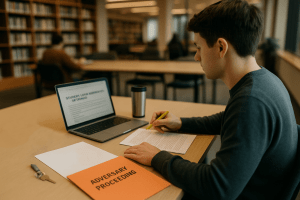
Can You File Bankruptcy on Private Student Loans?
Can You File Bankruptcy on Private Student Loans? Can you file bankruptcy on private student loans if they’ve become too
Error: Contact form not found.
Lorem ipsum dolor sit amet, consectetur adipiscing elit. Ut elit tellus, luctus nec ullamcorper mattis, pulvinar dapibus leo.
Can you file bankruptcy on private student loans if they’ve become too much to handle? Many borrowers assume student loans can’t be discharged in bankruptcy—but that’s not always true, especially for private student loans.
While discharging private student loans is difficult, recent legal shifts and court rulings have made it more achievable in certain cases. Understanding your rights and options is key to deciding your next step.
Filing bankruptcy on private student loans is different from federal loans. To succeed, you typically must prove undue hardship, but private loans sometimes offer additional legal angles.
Because these are private agreements, they don’t come with the same repayment plans or protections as federal loans. That’s part of why people ask: Can you file bankruptcy on private student loans when options run out?
To discharge private student loans through bankruptcy, most courts apply the Brunner test, which asks:
If you meet all three parts, you may be able to discharge your private student loans through a process called an adversary proceeding.
Simply filing for bankruptcy does not automatically discharge student loans. You must file a separate lawsuit within your bankruptcy case, called an adversary proceeding.
Here’s how it works:
Courts are becoming more receptive to these requests, especially when borrowers can show persistent hardship or predatory loan terms.
In some cases, yes. Not all private student loans are automatically protected like federal loans. Some may be challenged more easily if:
This means you may not need to prove undue hardship at all. An experienced bankruptcy attorney can help determine if your loan qualifies.
So, can you file bankruptcy on private student loans? Yes, but it’s not automatic. You’ll need to file the right type of case, challenge the loan through an adversary proceeding, and meet legal tests—or show that the loan doesn’t qualify for protection in the first place.
Bankruptcy is a serious decision,and it may be an option for borrowers facing unmanageable private student loan debt.
Still asking, “Can you file bankruptcy on private student loans”? Let the team at Bankruptcy Attorneys guide you. We’ll review your loan details, help you understand your legal options, and support you through the process. Get a free evaluation today to discuss your legal options.
Yes, but you must file an adversary proceeding and meet the undue hardship standard or challenge the loan’s status.
Chapter 13 may not discharge the loan, but it can pause collections and provide temporary relief through a repayment plan.
Approval rates have increased, especially for borrowers with low income and long-term hardship.
Yes, if the loan doesn’t meet the definition of a qualified education loan, you may not need to prove undue hardship.
Your bankruptcy continues, but the private loan remains. You may still benefit from discharge of other debts.
Attorney Advertising. This site is a legal marketing service and does not provide legal advice. Submitting information does not create an attorney-client relationship. Results are not guaranteed.

Can You File Bankruptcy on Private Student Loans? Can you file bankruptcy on private student loans if they’ve become too
| Cookie | Duration | Description |
|---|---|---|
| cookielawinfo-checkbox-analytics | 11 months | This cookie is set by GDPR Cookie Consent plugin. The cookie is used to store the user consent for the cookies in the category "Analytics". |
| cookielawinfo-checkbox-functional | 11 months | The cookie is set by GDPR cookie consent to record the user consent for the cookies in the category "Functional". |
| cookielawinfo-checkbox-necessary | 11 months | This cookie is set by GDPR Cookie Consent plugin. The cookies is used to store the user consent for the cookies in the category "Necessary". |
| cookielawinfo-checkbox-others | 11 months | This cookie is set by GDPR Cookie Consent plugin. The cookie is used to store the user consent for the cookies in the category "Other. |
| cookielawinfo-checkbox-performance | 11 months | This cookie is set by GDPR Cookie Consent plugin. The cookie is used to store the user consent for the cookies in the category "Performance". |
| viewed_cookie_policy | 11 months | The cookie is set by the GDPR Cookie Consent plugin and is used to store whether or not user has consented to the use of cookies. It does not store any personal data. |